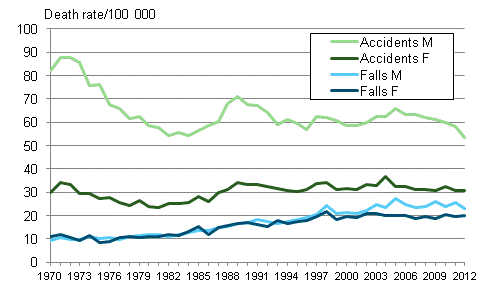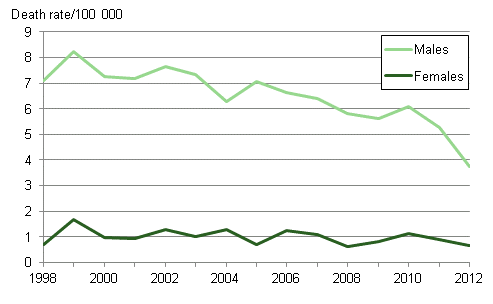5. Stumbling the most common cause of accidental deaths
Fatal accidents include such as fatal traffic accidents, fatal falls and stumbles, drownings, fatal fires and alcohol and drug poisonings. In the time series classification of the statistics on causes of death, alcohol poisonings are classified as alcohol-related causes. In 2012, accidents (excl. alcohol poisonings) caused good four per cent of all deaths. A total of 2,273 persons died in accidents in 2012, of whom 1,426 were men and 847 women. Men die in accidents more often than women. Men's mortality from accidents has, however, decreased while that of women has remained unchanged. The decrease in mortality from accidents is mainly the result of a drop in fatal traffic accidents and drowning accidents.
Figure 7. Accident mortality and separately deaths from accidental stumbles and falls in 1970 to 2012

In 2012, the most common accident leading to death both among men and women was stumbling or falling. Stumbling was the cause of death for every second accident mortality and 1,156 persons died from stumbling. Stumbling accidents have increased in absolute numbers by 40 per cent in the past 20 years. A majority of stumbles resulting in death occurred to people aged over 70.
The next most common accidents leading to death both for men and women were poisoning accidents (excl. alcohol) and transport accidents.
In 2012, a total of 243 persons died in transport accidents (excl. drowning accidents in water traffic), three-quarter of whom were men. For men, more than one in ten accidents took place in traffic (transport), for women there was slightly less.
Drowning accidents include drowning from falling into water and drowning while swimming or boating. In 2012, 117 persons died from drowning of which 31 in water traffic. Most drowning victims were men. Men's mortality from drowning accidents has decreased clearly over the past few years (Figure 8).
Fires claimed 84 lives. Of these three out of four were men. The were six carbon monoxide poisonings that resulted in death. There were 58 deaths caused by the heat of sauna. Seventy-five persons died of cold.
Figure 8. Mortality from drowning accidents 1998 to 2012

Contribution of intoxication to fatal accidents has decreased
In 2012, alcohol was a contributing factor on average in one in six fatal accidents. Seventeen per cent of persons that died in fatal accidents were intoxicated, i.e. 332 persons (Appendix table 2). Ten years ago the corresponding proportion was 23 per cent of fatal accidents. In fatal accidents intoxication means that the doctor signing the death certificate mentions that alcohol had contributed to the death. The figures exclude alcohol and drug poisonings where alcohol or drugs have not directly caused the death.
Intoxication was most common in sauna deaths. More than half of the people that died in a sauna were under the influence of alcohol at the time of death. Nearly half of the persons that died in fires or by drowning were also intoxicated. More than one in four of the persons that died of cold were intoxicated. Less than one in five of those who died in traffic were intoxicated. By contrast, in stumbling accidents, of which a majority occurred among persons aged over 70, less than one in ten were under the influence of alcohol.
More than 200 drug-related deaths in 2012
In 2012, there were 213 deaths in Finland that were caused by drugs. When calculating drug-related deaths, Statistics Finland uses a classification compiled by the European Monitoring Centre for Drugs and Drug Addiction (EMCDDA) that publishes statistics and reports on its Internet site: www.emcdda.europa.eu .
According to EMCDDA, cases where the underlying cause of death is drug psychoses, accidental poisoning, self-inflicted poisoning, and poisoning with undetermined intent are calculated as drug-related deaths. Deaths caused by drug psychoses are usually a result of drug addiction and long-term drug use. Accidental drug poisonings are cases where the death occurs shortly after the consumption of the substance. They can often also be referred to as overdoses. Self-inflicted poisonings with drugs are suicides. In 2012, forty suicides were committed with drugs. In poisonings with undetermined intent the intent remains unclear.
Table 2. Drug-related mortality 2000 to 2012
| Total | Males | Females | Total | Males | Females | |
| Number | Number | Number | Per 100 000 mean population | Per 100 000 mean population | Per 100 000 mean population | |
| 2000 | 134 | 109 | 25 | 2,6 | 4,3 | 0,9 |
| 2001 | 110 | 78 | 32 | 2,1 | 3,1 | 1,2 |
| 2002 | 97 | 69 | 28 | 1,9 | 2,7 | 1,1 |
| 2003 | 101 | 76 | 25 | 1,9 | 3,0 | 0,9 |
| 2004 | 135 | 96 | 39 | 2,6 | 3,8 | 1,5 |
| 2005 | 126 | 95 | 31 | 2,4 | 3,7 | 1,2 |
| 2006 | 138 | 107 | 31 | 2,6 | 4,2 | 1,2 |
| 2007 | 143 | 116 | 27 | 2,7 | 4,5 | 1,0 |
| 2008 | 169 | 120 | 49 | 3,2 | 4,6 | 1,8 |
| 2009 | 175 | 130 | 45 | 3,3 | 5,0 | 1,7 |
| 2010 | 156 | 117 | 39 | 2,9 | 4,4 | 1,4 |
| 2011 | 197 | 156 | 41 | 3,7 | 5,9 | 1,5 |
| 2012 | 213 | 161 | 52 | 3,9 | 6,1 | 1,9 |
The drugs referred to in EMCDDA's classification are mainly opioids. In addition to opioids, drugs also refer to cannabis and cannabinoids, other hallucinogens, and stimulants suitable for abuse, such as amphetamine and its derivatives. In 2012, 64 per cent of drug-related deaths were associated with accidental overdoses of opioids (137 cases).
The statistics have been compiled in accordance with WHO's recommendation based on the substance judged as most influential. In many cases the death is actually the result of multiple substance poisoning where the person has also digested other substances like alcohol and/or psychopharmacons.
Considerably more men than women die of drugs. In 2012, the share of women in drug-related deaths was 24 per cent. However, in suicides committed with drugs, the share of women is clearly higher, 43 per cent. In 2012, most drug-related deaths in absolute numbers occurred among persons aged 30 to 34. For persons aged over 65, opioids have been in medicinal use while in younger age groups these drugs have mainly been used as intoxicants.
Source: Causes of death, Statistics Finland
Inquiries: Airi Pajunen 09 1734 3605, Kati Taskinen 09 1734 3297, kuolemansyyt@stat.fi
Director in charge: Riitta Harala
Updated 30.12.2013
Official Statistics of Finland (OSF):
Causes of death [e-publication].
ISSN=1799-5078. 2012,
5. Stumbling the most common cause of accidental deaths
. Helsinki: Statistics Finland [referred: 19.2.2026].
Access method: http://stat.fi/til/ksyyt/2012/ksyyt_2012_2013-12-30_kat_005_en.html

